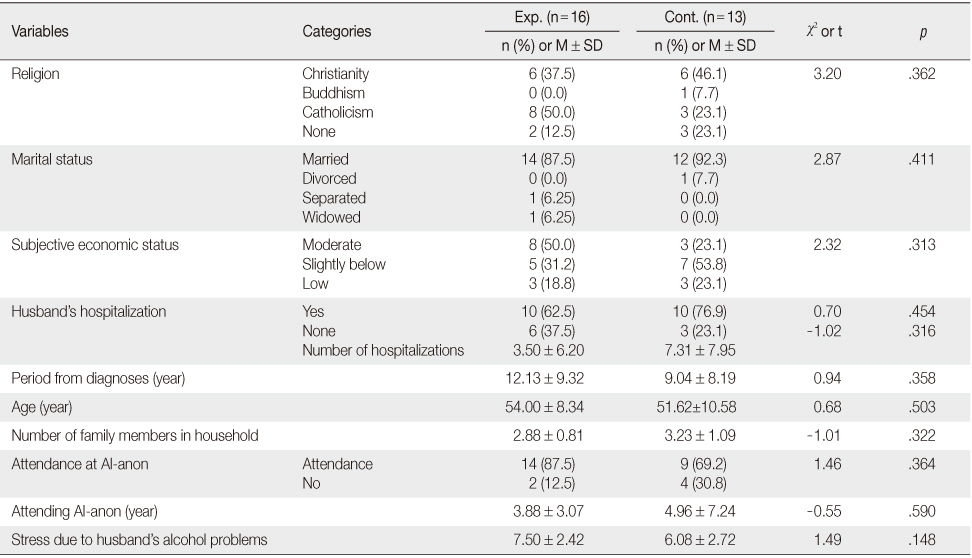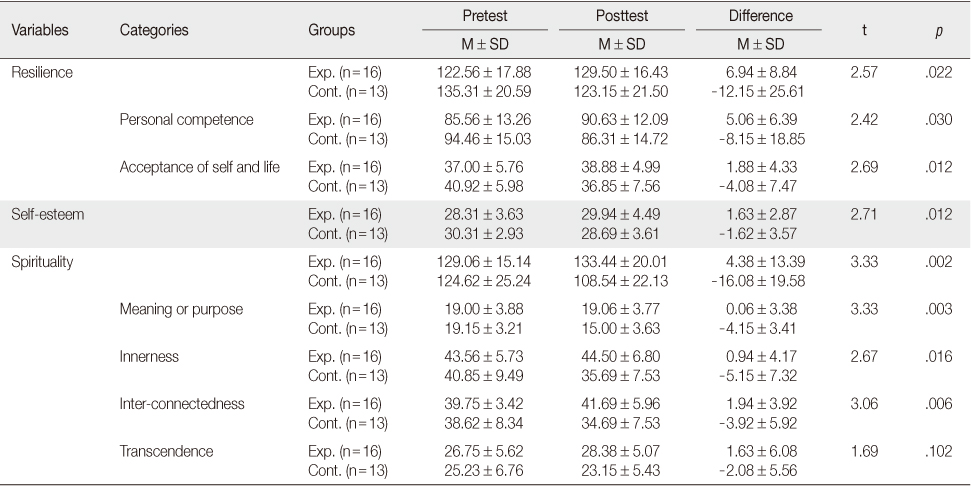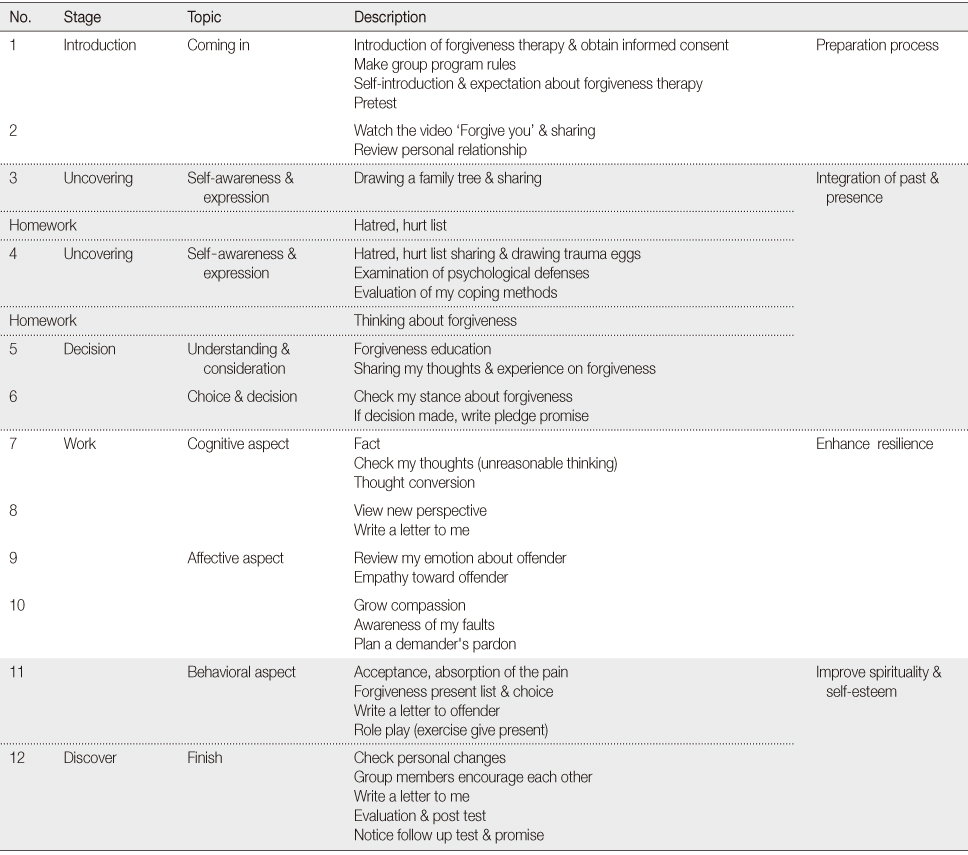Articles
- Page Path
- HOME > J Korean Acad Nurs > Volume 44(3); 2014 > Article
-
Original Article
- Effectiveness of Forgiveness Therapy on Resilience, Self-esteem, and Spirituality of Wives of Alcoholics
- Hee Kyung Kim, Mihyoung Lee
-
Journal of Korean Academy of Nursing 2014;44(3):237-247.
DOI: https://doi.org/10.4040/jkan.2014.44.3.237
Published online: June 30, 2014
Department of Nursing, Inha University, Incheon, Korea.
- Address reprint requests to: Lee, Mihyoung. Department of Nursing, Inha University, 100 Inha-ro, Nam-gu, Incheon 402-751, Korea. Tel: +82-10-3738-9675, Fax: +82-32-236-9479, mhl56@hanmail.net
© 2014 Korean Society of Nursing Science
This is an Open Access article distributed under the terms of the Creative Commons Attribution NoDerivs License. (http://creativecommons.org/licenses/by-nd/4.0/) If the original work is properly cited and retained without any modification or reproduction, it can be used and re-distributed in any format and medium.
Figure & Data
REFERENCES
Citations

- Ergenler ve Genç Yetişkinler İçin İçsel Manevi Değerler Ölçeğinin Geliştirilmesi: Minnettarlık Affedicilik ve Sabır Güçlerinin Değerlendirilmesi
Olcan Aslan, Ömer Faruk Kabakçı
Bilimname.2025; (53): 71. CrossRef - Effect of forgiveness-based bibliotherapy on forgiveness, self-esteem and psychological symptoms in nursing students: A randomized controlled study
Dilek Avci, Sila Kuzu
Teaching and Learning in Nursing.2025; 20(4): e1176. CrossRef - Ser mulher em relacionamento com homens que vivenciam o adoecimento pelo uso de álcool: revisão integrativa
Laiza Carvalho Costa, Maria Lidiany Tributino de Sousa, George Gonçalves Machado
Ciência & Saúde Coletiva.2025;[Epub] CrossRef - Ser mujer en relación con hombres que viven enfermedad por el consumo de alcohol: revisión integrativa
Laiza Carvalho Costa, Maria Lidiany Tributino de Sousa, George Gonçalves Machado
Ciência & Saúde Coletiva.2025;[Epub] CrossRef - Being women in relationship with men who experience illness due to the use of alcohol: integrative review
Laiza Carvalho Costa, Maria Lidiany Tributino de Sousa, George Gonçalves Machado
Ciência & Saúde Coletiva.2025;[Epub] CrossRef - Subjective well-being: self-forgiveness, coping self-efficacy, mindfulness, and the role of resilience?
Feridun Kaya, Hatice Odacı
British Journal of Guidance & Counselling.2024; 52(4): 628. CrossRef - Spirituality, forgiveness and self-esteem throughout adulthood in France
Agli Océane, Bailly Nathalie, Cuervo-Lombard Christine-Vanessa
Archives of Gerontology and Geriatrics Plus.2024; 1(4): 100098. CrossRef - FORGIVENESS AND RESILIENCE: A CASE OF ADOLESCENTS WITH BROKEN HOME DIVORCE
Tut Wuri Tri Lestari, Arthur Huwae
Counsenesia Indonesian Journal Of Guidance and Counseling.2023; 4(1): 8. CrossRef - Psychosocial Interventions to Improve Psychological, Social and Physical Wellbeing in Family Members Affected by an Adult Relative’s Substance Use: A Systematic Search and Review of the Evidence
Ruth McGovern, Debbie Smart, Hayley Alderson, Vera Araújo-Soares, Jamie Brown, Penny Buykx, Vivienne Evans, Kate Fleming, Matt Hickman, John Macleod, Petra Meier, Eileen Kaner
International Journal of Environmental Research and Public Health.2021; 18(4): 1793. CrossRef - Factors Affecting Forgiveness of Wives of Alcoholics
Hee Kyung Kim
Journal of Korean Academy of psychiatric and Mental Health Nursing.2021; 30(1): 42. CrossRef - FORGIVENESS, SELF-ESTEEM, AND RESILIENCE IN ADULT VICTIMS OF BULLYING
Dinu Hafidh Muvariz, Hanifah Nur Fitriani, Indah Nisrina, Fuad Nashori
al-Balagh : Jurnal Dakwah dan Komunikasi.2020; 5(2): 165. CrossRef - Self-Forgiveness as a Critical Factor in Addiction and Recovery: A 12-Step Model Perspective
Jon R. Webb, Loren L. Toussaint
Alcoholism Treatment Quarterly.2018; 36(1): 15. CrossRef - Effects of the Self-transcendence Enhancement Program among Patients with Drug Addiction: A Mixed Method Research
Younsil Kim, Suk-Sun Kim
Journal of Korean Academy of Psychiatric and Mental Health Nursing.2017; 26(1): 1. CrossRef - Self-Esteem, Self-Stigma, and Stigmatization among People with Mental Illness in Japan Who Have Work Experience
Hatsumi Yoshii, Kouhei Akazawa, Hidemitsu Saito
Psychology.2016; 07(08): 1174. CrossRef - Effects of Forgiveness Therapy Program on Self-esteem, Anger, and Forgiveness in People who Abuse Alcohol
Sun Ja Kang, Soo Jin Kim
Journal of Korean Academy of Psychiatric and Mental Health Nursing.2015; 24(4): 300. CrossRef
Homogeneity of General Characteristics (N=29)
Exp.=Experimental group; Cont.=Control group.
Homogeneity of Dependent Variables (N=29)
Exp.=Experimental group; Cont.=Control group.
Differences in Dependent Variables between Experimental and Control Groups (N=29)
p≤ .05; Difference=Post-Pre; Exp.=Experimental group; Cont.=Control group.
Follow up Test of Intervention Group (Persistence Effect Verification) (N=14)
p≤ .05.
Contents of Forgiveness Therapy
Exp.=Experimental group; Cont.=Control group.
Exp.=Experimental group; Cont.=Control group.
 KSNS
KSNS
 E-SUBMISSION
E-SUBMISSION





 Cite
Cite

